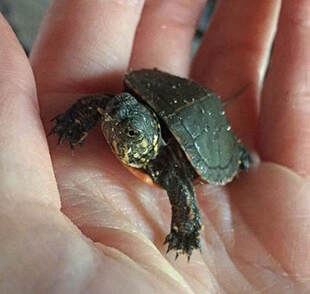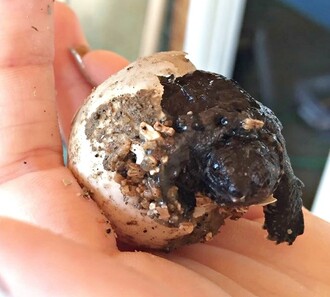|
by Heather Kerrison Late May and early June represent an important time of the year for turtles in Ontario as it is the peak of nesting season. This means that they leave the safety of the wetlands, creeks, and rivers they call home in search of appropriate nesting sites. In Southern Ontario, no area of land is further than 1.5 km from a roadway which means that this can be a dangerous time for the turtles and the eggs they plan to lay. The biggest threats to the survival of Ontario turtles are roadways and habitat loss. Reptiles, including turtles, account for a large portion of the wildlife killed on Ontario roads annually. Turtles in particular often lay their eggs on the soft substrate found along roads, making it more likely for them to be struck while crossing. A positive of reduced traffic and physical distancing is that they may have a better chance of crossing safely this season. Midland painted turtle hatchling (left), and snapping turtle hatchling (right). Turtles are slow to reach sexual maturity and only have the chance to lay eggs once a year, with those eggs facing ample threat from predation from animals like raccoons and foxes. Losing just one mature adult can significantly impact a population. Ontario has 8 species of turtles; until 2018, the midland painted turtle was the only Ontario turtle species to not yet be listed as a species at risk. When the Committee of Endangered Wildlife in Canada (COSEWIC) designated the species as Special Concern, this made eight Ontario turtle species at risk. This means that all species are at risk if active conservation and protection measure are not put in place immediately. Concerned citizens and wildlife lovers alike can help make sure that Ontario's turtles safely lay their eggs and make it back to their respective homes. Simply driving with caution during this time of year and paying particular attention to wildlife crossing signs is important. Further, if you see a turtle on a roadway, you can help it cross. It is very important that you always help a turtle across in the direction that they are traveling. They know where they are heading and if you turn them around, they will simply attempt to cross the road the same way again. Some Important Tips for Helping Turtles:
If you find an injured turtle that has already been struck, refer to this Ontario Turtle Conservation Centre page on how to get it to help. It is important to note that even if a female turtle has been struck and may not survive, the eggs she is carrying can be saved and incubated at a care facility. This ensures the young have a chance to hatch and grow the population of the species. Although the Ontario Turtle Conservation Centre is based in Peterborough, they have over thirty turtle response centres and hundreds of volunteers across Ontario who can organize a transfer to their hospital. Turtles are a precious part of our ecosystems here in Ontario and we can all take steps to help protect them.
2 Comments
5/20/2020 04:39:59 am
You have done a great job I hope you will do much batter in the future.
Reply
12/16/2023 02:25:08 am
Professionals in erosion control employ a variety of methods, such as the installation of erosion control blankets, silt fences, and vegetation management, to minimize the impact of natural forces on the terrain.
Reply
Leave a Reply. |
ELB MembersBlogs are written by ELB members who want to share their stories about Ontario's biodiversity. Archives
January 2023
Categories
All
|




 RSS Feed
RSS Feed